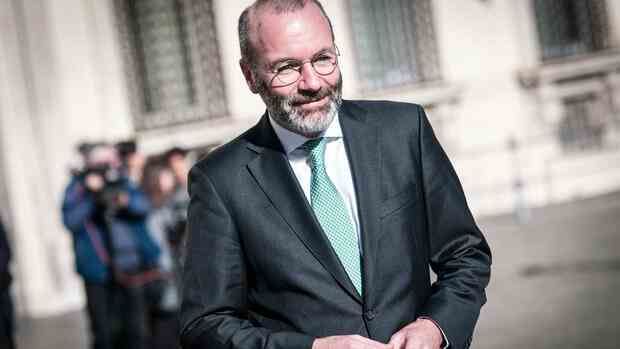Weber is currently the group and party leader of the European People’s Party.
(Photo: IMAGO/NurPhoto)
The central power struggle in Brussels is taking place between two Germans, both of whom come from the same party family: Manfred Weber, CSU member and head of the European People’s Party (EPP), is acting more and more openly against the policies of Ursula von der Leyen, CDU member and head of the European Commission.
Most recently, Weber goaded his people in the European Parliament to vote against a resolution that was supposed to support von der Leyen’s industrial policy course. All points that are important to the EPP in the debate were mentioned there. MEPs then had trouble explaining what they didn’t like about the text.
Resolutions like these have little practical relevance. The maneuver was interpreted all the more as a symbol that Weber intends to put further pressure on von der Leyen.
Weber has two legitimate concerns. First, he and many EPP MEPs disagree with the EU Commission’s climate policy. The ban on internal combustion engines, tight regulations for green hydrogen and ever-tightening regulations for industry are the opposite of what conservatives think is right. In addition, there are proposals for supply chains and emission standards, which, from the point of view of the EPP, primarily restrict entrepreneurial freedom.
Much of this is shaped by the Social Democratic Vice President of the EU Commission Frans Timmermans and by France’s liberal President Emmanuel Macron, to whom von der Leyen owes her office. Few CDU MPs see von der Leyen as one of them.
Christoph Herwartz, correspondent in the Handelsblatt office in Brussels, analyzes trends and conflicts, regulatory projects and strategic concepts from the inner workings of the EU. Because anyone interested in business needs to know what’s going on in Brussels. You can reach him at: [email protected]
>> Read here: The EU must mobilize hundreds of billions of euros for the green transformation of the economy. The best thing would be to speed up the Capital Markets Union. There’s only one problem
Secondly, Weber is also fighting for influence for the European party families and for the European Parliament when filling the commission after the European elections. In 2014, the EU parties entered the European election campaign with their own top candidates for the first time. But after the 2019 election, the heads of state and government agreed on von der Leyen, who did not take part in this competition at all.
If, after the 2024 election, the heads of state and government don’t give a damn about the wishes of the parties, it would be a setback for all those who want to make Europe more democratic and dream of cross-border electoral lists.
Giorgia Meloni should help
However, the timing is extremely unfavorable. If the EPP nominates von der Leyen as the top candidate, it has the best chance of asserting itself. However, Weber recently indicated that he could imagine Roberta Metsola as the top candidate instead.
Possible competitors in the race for the top candidacy of the EPP.
(Photo: AP)
The Maltese has been President of the European Parliament for a year. She is respected by many, but falls far behind von der Leyen in terms of experience and notoriety. Sending them into the race for the chair of the Commission might be interesting from the point of view of party logic within the EPP, but would hardly be conveyed to the outside world.
Weber’s campaign for alliances with parties to the right of the EPP is similarly risky. In Italy, Giorgia Meloni is the prime minister who, in her first few months in office, appears supple enough not to constantly attract attention as a post-fascist. Weber also apparently believes that Czech Prime Minister Petr Fiala, whose party is also right-wing conservative, is compatible.
Weber has to put up with the accusation of wanting to move the party to the right. But if he leads the EPP to new heights in this way, he will be thanked. Just eight of the 27 EU member states are still governed by EPP parties. The largest among them are Greece, Sweden and Austria. A real heavyweight like Italy is missing.
The fact that Weber distances himself from the Commission President because of such ulterior motives is normal in politics. However, there has recently been a lot of resentment in their own parliamentary group and also from CDU leader Friedrich Merz.
>> Read here: Ex-President for the Protection of the Constitution Maassen does not want to leave the CDU. For the party, the case marks a turning point in dealing with the right and the AfD.
Because Weber’s actions do not always seem strategically well thought-out to the critics, but driven by a desire for revenge against von der Leyen. When she became President of the Commission in 2019, Weber had also figured out a chance for the office.
In addition, there are allegations about Weber’s salary: The EPP boss can be paid just as well as his predecessors, although, unlike them, he also receives the full salary of a member of parliament and group leader in the European Parliament.
More: Italy’s Prime Minister Meloni opposes the pro-Russian forces in her right-wing coalition. She is even considering sending fighter jets to Kiev
